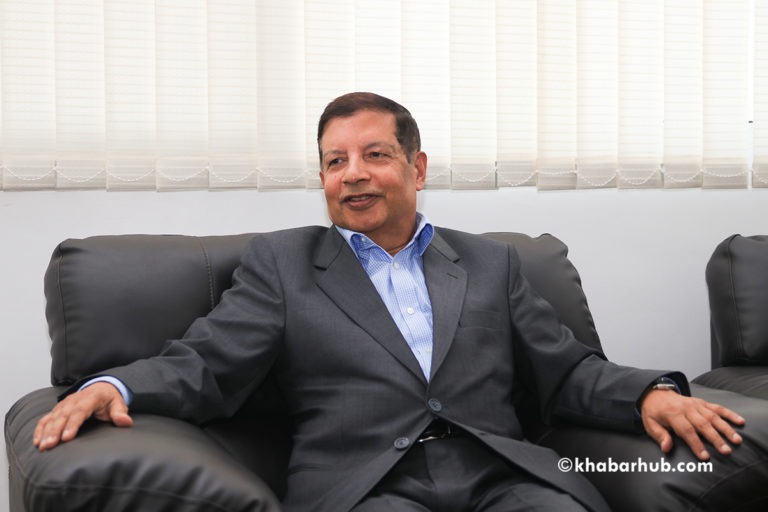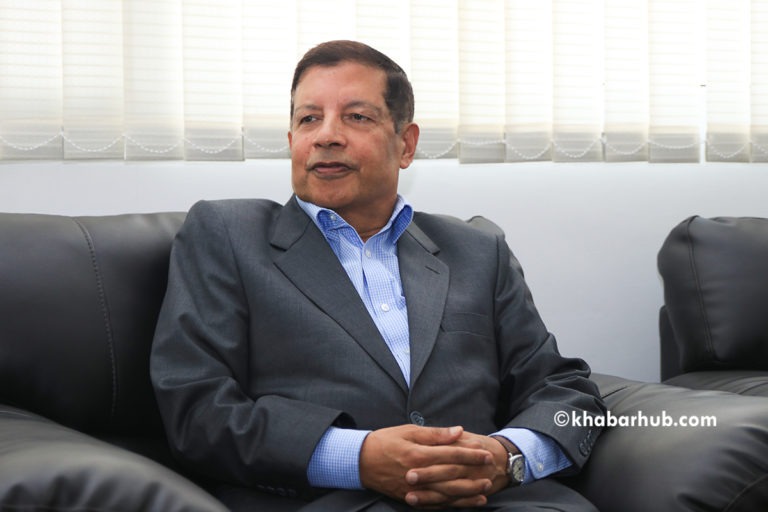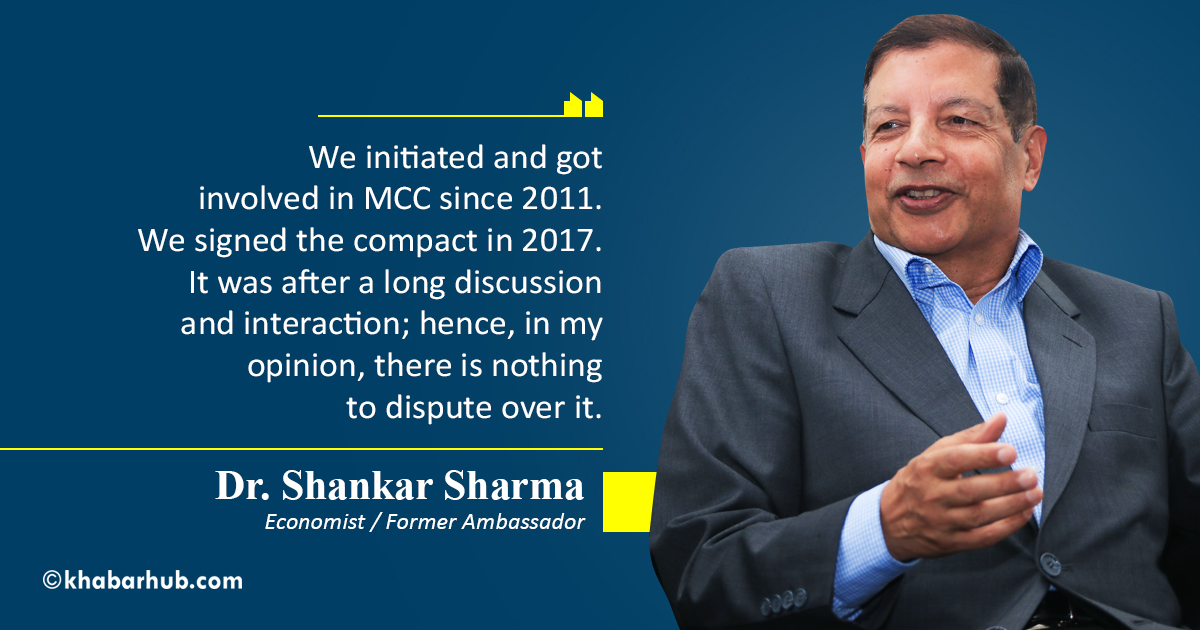Dr. Shankar Sharma is one of the most highly acclaimed economists of Nepal. He has vast experience in various high-level responsibilities such as the Vice Chairman of the National Planning Commission (NPC) and Nepal’s Ambassador to the USA.
Dr. Sharma spent some years teaching at Tribhuvan University. He executed the responsibility as an expert advisor to the Constituent Assembly. He has also worked as a senior economist in Singapore. He was Nepal’s ambassador to the USA from 2009 to 2014, and Vice Chairman of NPC from 2002 to 2006.
While Sharma was the ambassador to the USA, Nepal had approached for the Millennium Challenge Corporation (MCC) in 2011. After Nepal fulfilled all the conditions, Nepal got selected for the MCC grant.
On behalf of Khabarhub, Amrit Raj Kafle talked to Dr. Sharma on various issues such as MCC and the new budget. Excerpts of the interview:
During your tenure as Nepal’s Ambassador to the USA, Nepal had approached for the MCC grant. Now, the grant has come, however, there is a big dispute over it. What made MCC a disputable grant?
Yes, we initiated and got involved in MCC since 2011. We signed the compact in 2017. It was after a long discussion and interaction; hence, in my opinion, there is nothing to dispute over it. The sooner it is ratified, the better.
However, since there has been commotion over the MCC everyone related to the program should be brought together, interact thoroughly and come to a conclusion.

Nepali Congress President Sher Bahadur Deuba has already stated that the party is in favor of immediately ratifying the MCC. The ruling Nepal Communist Party had formed a political committee to study about it, it gave mixed opinions. If they have some doubts about some of the points included in MCC, we should settle through discussion. If that is not enough, there is MCC’s office in Kathmandu which can also be corresponded to address any doubts. Also, we can directly communicate to the MCC headquarters.
Everyone involved in the process throughout should be brought together for discussions, and then settle it. This should be done at the earliest.
Nepal has already agreed to take a loan under BRI from China. However, there is a dispute over the MCC grant. What’s worth debating in MCC?
I don’t understand it as well. This confusion should not be prolonged much longer. It mars our diplomatic and bilateral relations. This way the society is likely to be more divided unnecessarily. Instead of this indecisiveness prolonging, the meeting of all concerned stakeholders should sit together and settle it instantly.
The government has included it in the budget. The Prime Minister, Foreign Minister, and Finance Minister seem committed to taking the process ahead. It should be settled at the earliest.
The last two budgets of this government had also included the MCC grant under the prospective foreign grant category.
As the grant became disputable after signing BRI, as a diplomat, do you see any connection between BRI and MCC here?
At surface level, it seems to have become the victim of internal conflict for power within the Nepal Communist Party. Otherwise, it should be settled via dialogue. The Prime Minister has already stated it while defending the government’s policy and programs in Parliament.
The government is an uninterrupted successor of the past government’s deals. If the previous government’s deals are discontinued or disrupted by the succeeding government, it gives birth to this sort of anarchical system.
I think the Prime Minister has already addressed this. The BRI has also stagnated in the feasibility study. We should continue doing our homework on it.
Our main objective is to ensure credibility for trade and supply of electricity. We have to think about our national interest in this issue irrespective of BRI or any other deals.
When a report of the study comes, perhaps there will be a discussion on many other aspects such as whether to take a loan or grant. Then we can debate on it.
The government has brought the budget for the fiscal year 2020/21. How do you analyze the budget’s target?
The budget has included all sectors by prioritizing the coronavirus pandemic control, employment and agriculture. Therefore, it has come out well.
Local levels complain they get instructions from higher authorities but do not get sufficient financial support required for taking development efforts forward. The challenge basically lies in coordination.

There are numerous programs in the employment sector. A total of Rs 12 billion has been earmarked for the Prime Minister Employment Program, which is double compared to the previous year. There are programs of skill development as well. Such programs exist for a long time, yet there are few institutions providing quality training. There is a problem with the training. This needs to be addressed.
Sectors such as tourism and industries are also addressed to some extent. There is a plan for Rs 150 billion refinancing funds. The government has made plans to provide loans to small industries and domestic enterprises at a 5 percent interest rate.
The refinancing provision has to be made more convenient as well, although there is the fund of 50 billion, hardly 20 billion has been used.
The budget in agriculture has not increased much. Bringing the chemical fertilizers and the seeds on time is a great challenge.
The supply system is affected due to the lockdown in India. Management is a big challenge in this regard as well.
The budget has asked the small industries to take loans and provide salaries to the workers. It’s not applicable in many cases. There is no coordination in management. The government should be more serious about it.
The government has set a target of 7% economic growth. However, the capital budget in the budget is less than that of the running budget. The capacity of the capital budget expenses is also poor. Is the economic growth rate of the budget attainable?
The target of a 7% growth rate is very challenging. There is the least chance of attaining it. Provided we managed to overcome coronavirus threats by the end of mid-September, we will have 10 months left for economic activities.
Generally, no remarkable activities take place in July and August, but the corona pandemic is likely to paralyze beyond September.
The money promised by the World Bank, Asian Development Bank is in pipeline. But there is a large sum not utilized to date as well. That amount can be utilized to give life to a staggering economy. Provided the foreign aid projects in the pipeline are authenticated, the economic activities may get a new life.
To what extent can it influence inflation? Experts are skeptical about the touchstones of the price hike.
The basket should be changed as per the time. Our consumption demand is not based on foodstuffs alone. That should be changed as well.
Next thing is, the price-hike here is dependent on the open border in India.
Although the monetary policy is relatively liberal this time, the lack of enough currency and low demand due to coronavirus may reduce the pressure on inflation.
The custom of petroleum products is increased in this budget. As the government has reduced the tax in air-fuel and increased in diesel, goods of daily consumption are likely to be affected. What effect can it have actually?
This time there is a remarkable decline in the price of petroleum products in the international market. The price that used to be around 55 dollars per barrel has fallen to 30 dollars per barrel.
That has taken the price of petroleum products down in Nepal. Considering the fact that provided it turns cheaper than India, it may be trafficked to India, the government might have increased the tax here in Nepal. Besides, the price hike in petroleum products may be a compulsion for the government as other sources of revenue generation are in poor condition.
Talking about the sources of the budget, do you think the government can mobilize the foreign loan and grants as set in the budget?
There was some money in the pipeline this year. It seems that the World Bank and Asian Development Bank are also willing to offer further help. But since our development partners are also struggling against coronavirus pandemic, the crisis may come in the coming years.
Most of the bilateral aids of the coming year are likely to go in COVID-19 affected health sector, multilateral aid may go to employment generation and poverty reduction. We have to understand that we may not get the help in the sector we expect, that’s why we have to strengthen and empower our internal economy.









Comment